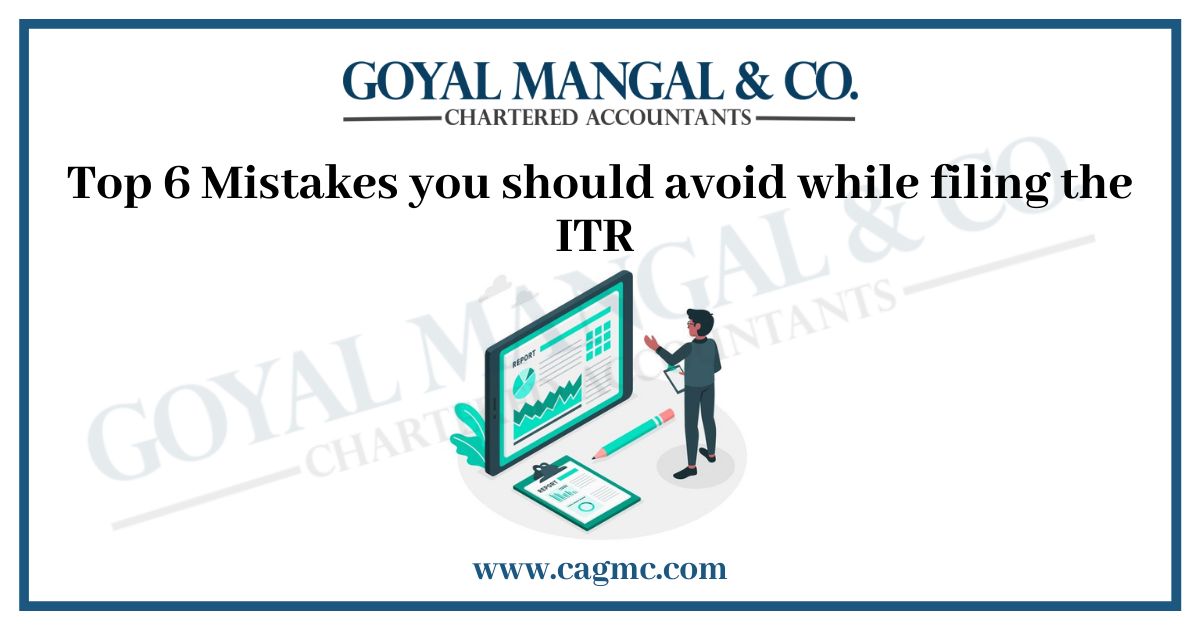
The Income Tax Return (ITR) is a self-declaration form in which taxpayers are obliged to provide information about their income and tax liability.
The majority of individual taxpayers record their own ITR. Because income tax is complicated legislation, a typical taxpayer does seem to make mistakes when filling out the ITR forms. In this article, we will examine some of the most common mistakes made by individual taxpayers while filling out the ITR and how they may be avoided.
|
Table of Content |
Mistakes you should avoid while filing ITR
We have listed below some of the most common mistakes taxpayers make at the time of filing tax returns:
Irregularities
In an effort to crack down on tax evaders, while also easing the transition to anonymous evaluation, the ITR forms have been changed to request additional details from taxpayers. The information previously accessible with the tax department is now auto-populated on the ITR forms. Incomes such as interest, dividends, and pay are pre-filled on Form 26AS, in addition to the information provided to the employer and reported in Form 16. The bank account connected to the taxpayer’s PAN/bank account chosen for reimbursement is likewise pre-filled.
While pre-filling speeds up the return filing process, it also makes ITR’s more prone to mistakes. Cross-checking pre-filled data in ITR forms is therefore critical, and any mistakes must be addressed before submission. For example, each entry in the TDS schedule must be meticulously mapped. It must be assured that the associated income is taxed/claimed as exempt under the relevant income head. Furthermore, regardless of the option provided to the employer, the option to avail old/new regime must be selected manually.
While the ITR tool allows you to alter pre-filled data, any errors in Form 26AS/ Form 16 may only be remedied by the tax deductor. Address any discrepancies before submitting the return to avoid issues during the processing of the return.
Earnings and costs
The ITR, which is a self-declaration, is used by the government to acquire information about the taxpayers’ income. This information is compared to the information it collects from specified individuals’ in order to indicate any discrepancies. These specified individuals’ must disclose high-value transactions involving their account holders. For example, banks must disclose cash deposits of Rs 10 lakh or more in a fiscal year, and the registrar must declare the sale or acquisition of immovable property of Rs 30 lakh or more.
Form 26AS was recently updated to make all reportable data available to taxpayers. If the taxpayer notices any inaccuracies, he may contact the specified reporting people to have the details updated in order to avoid scrutiny assessment due to mismatch. In some situations, they may even make a complaint on the income tax portal.
Incomplete ITR Form
The Central Board of Direct Taxes has issued notifications for seven different types of ITR Forms. Filing the ITR in the incorrect form might result in a faulty/invalid return. This may include fines for failure to file a return or penalties for failing to disclose information. A person earning a salary in India, for example, may also possess international assets. If he decides to declare income in ITR-1, he will be unable to disclose overseas assets and may face scrutiny.
Individuals are required to submit ITR 1 if they have an income of up to ’50 lakh from salary, rent from one dwelling property, and other sources. If a taxpayer has income from capital gains, whatever of the amount, ITR 2 must be submitted. If income includes income from a company or profession, or if presumptive taxation is chosen, a more sophisticated ITR 3/ ITR 4 must be filed.
With the ITR filing deadline approaching, individuals must prepare to file their taxes on time. To prevent any penalties, it is critical to guarantee truthful and proper disclosure.
ITR’s must be filed by the deadlines
The taxpayer should constantly be mindful of the deadline for reporting the ITR, failing which he or she would be obligated to pay interest under section 234A, which shall be a simple interest of 1% each month or part of a month.
Providing proper qualifications
The taxpayer must always supply the accurate name, cellphone number, email address, amount of income and its kind, PAN details, and other information necessary to submit an ITR.
All bank accounts that should be connected to the PAN card should be listed
The income tax agency has made it essential to link all of your bank account information to your pan card. The taxpayer is required to declare any bank accounts, including Demat accounts that he maintains in India or outside of India.
Concluding Remarks
One of the most significant advantages of filing an income tax return is the ability to claim tax deductions. There are various strategies to lower your overall tax obligation. If you made such tax-saving investments but paid too much income tax in the form of TDS, you can get a refund by filing tax returns.
Hence, keeping in mind the importance of ITR it is a must that should be error-free.


